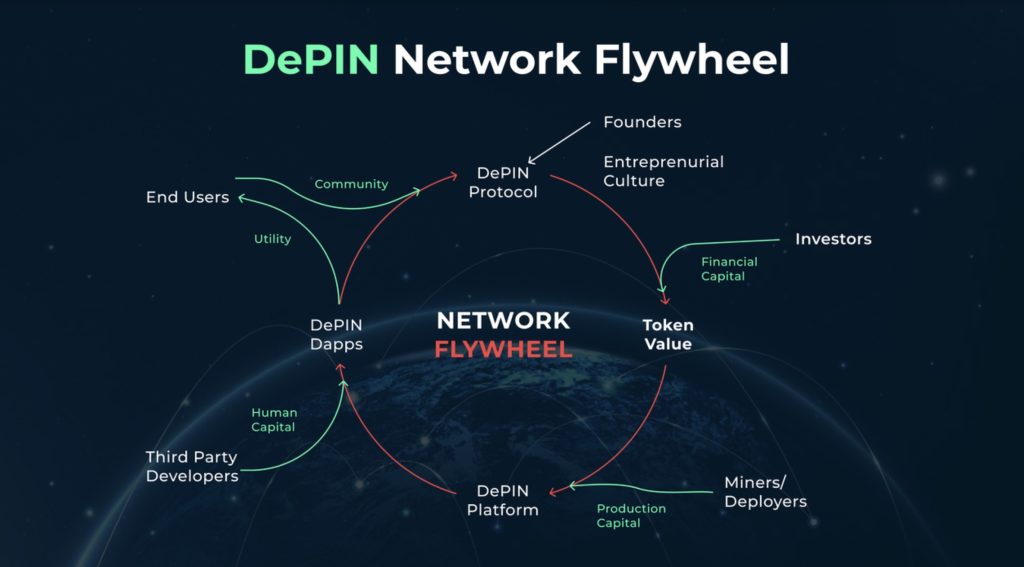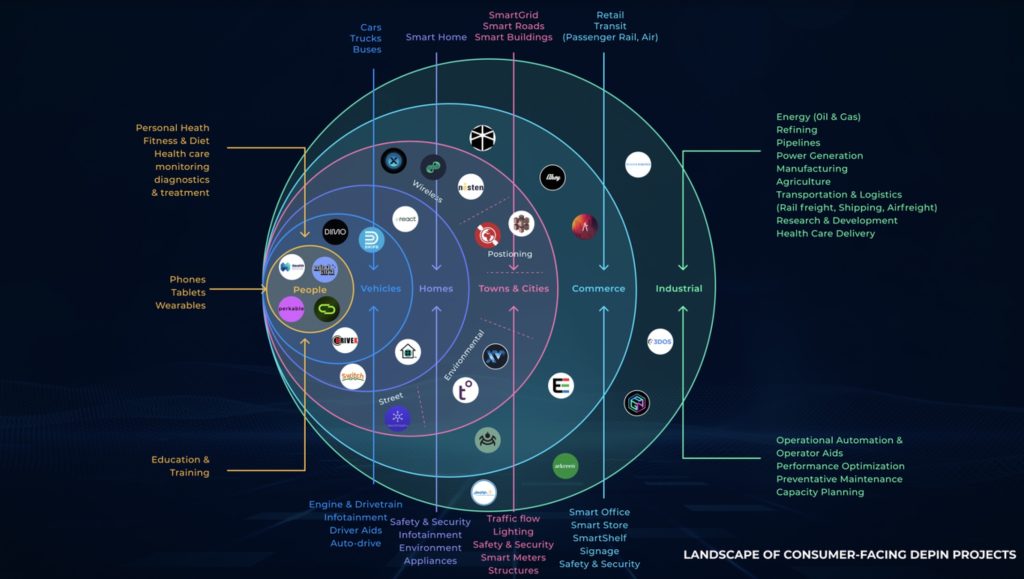Table of Contents
- What are DePINs?
- Key Characteristics of DePINs
- Benefits of DePINs
- Examples of DePIN Applications
- DePIN Tokens
- Conclusion:
What are DePINs?
DePINs are blockchain-based protocols that enable the creation and maintenance of physical infrastructure by leveraging tokenization, decentralized governance, and interoperability. They empower individuals and communities to contribute to infrastructure development while also rewarding them for their participation.
Key Characteristics of DePINs
- Decentralization: DePINs operate without the need for centralized control, breaking away from traditional infrastructure models dominated by large corporations or governments. Thisdecentralization fosters a more democratic and equitable approach to infrastructure development.
- Tokenization: DePINs employ tokens, often native to their respective protocols, to incentivize participation and reward individuals for contributing to the network’s growth. These tokens can be used for various purposes, such as staking, governance, and accessing network services.
- Interoperability: DePINs are designed to be interoperable with other blockchain networks and traditional infrastructure systems. This interoperability enables seamless integration and collaboration across different DePINs and traditional infrastructure providers.
Benefits of DePINs
- Increased Efficiency: Decentralized networks can leverage distributed consensus mechanisms and automation to streamline infrastructure development processes, making them more efficient and cost-effective.
- Enhanced Scalability: DePINs can expand to accommodate growing infrastructure demands without relying on centralized entities, ensuring widespread access and coverage.
- Improved Equity: DePINs democratize infrastructure development, giving individuals and communities a greater say in how and where infrastructure is built, fostering greater inclusivity and accessibility.

Examples of DePIN Applications
1. Decentralized Wireless Networks
DePINs like Helium have demonstrated the potential of decentralized wireless networks. By utilizing unused data bandwidth from individuals’ devices, these networks provide alternative connectivity options and address coverage gaps in underserved areas.
2. Decentralized Energy Infrastructure
DePINs can facilitate the adoption of renewable energy sources by enabling the development of decentralized energy grids and microgrids. These networks allow individuals to share and sell excess energy generated from their solar panels or other renewable energy sources.
3. Decentralized Mobility Infrastructure
DePINs can support the development of smart city infrastructure, including autonomous vehicles, smart parking, and traffic management systems. By utilizing blockchain technology and sensor data, DePINs can optimize traffic flow, improve parking availability, and enhance safety in urban environments.
4. Decentralized Data Storage
DePINs can contribute to the growth of decentralized storage networks, providing secure and cost-effective data storage solutions. These networks, like Filecoin and Siacoin, distribute data across multiple nodes, ensuring redundancy and preventing data loss.
5. Decentralized Edge Computing
DePINs can enable the deployment of edge computing infrastructure, bringing computing power closer to users and reducing latency. This decentralized approach can improve the performance of applications that require real-time processing, such as virtual reality and augmented reality experiences.

DePIN Tokens
- Helium (HNT): Helium is a decentralized wireless network that utilizes unused data bandwidth from individuals’ devices to provide alternative connectivity options and address coverage gaps in underserved areas. The HNT token is used to incentivize individuals to operate Helium hotspots, which are devices that transmit and receive data on the network.
- Filecoin (FIL): Filecoin is a decentralized storage network that provides secure and cost-effective data storage solutions. The FIL token is used to incentivize individuals to provide storage space on the network and to reward those who store data securely.
- Siacoin (SC): Siacoin is another decentralized storage network that is similar to Filecoin. The SC token is used to incentivize individuals to provide storage space on the network and to reward those who store data securely.
- Swarm City (SWT): Swarm City is a decentralized mobility infrastructure platform that aims to create a more efficient and equitable transportation system. The SWT token is used to incentivize individuals to participate in the Swarm City network, such as providing rides or renting out vehicles.
- Power Ledger (POWR): Power Ledger is a decentralized energy trading platform that enables individuals and businesses to trade renewable energy directly with each other. The POWR token is used to facilitate energy trading on the Power Ledger platform.
Conclusion:
DePINs represent a transformative shift in infrastructure development, offering a more decentralized, equitable, and scalable approach to building and maintaining the physical infrastructure we rely on. As DePIN technology matures and adoption grows, we can expect to see a profound transformation in the way we interact with infrastructure in our daily lives.
These are just a few examples of the many DePIN coins and tokens that are currently available. As the DePIN field continues to develop, we can expect to see even more innovative and disruptive projects emerge.
here are the links to the articles about DePINs that I mentioned:
Decentralized Physical Infrastructure Networks (DePINs): A Revolution in Infrastructure Development (Coindesk): https://cryptsy.com/decentralized-physical-infrastructure-networks-2/
Decentralized Infrastructure Networks: The Future of Infrastructure (Forbes): https://www.forbes.com/sites/forbesbusinesscouncil/2023/07/14/the-future-of-infrastructure/
Decentralized Infrastructure Networks: A New Paradigm for Infrastructure Development (Cointelegraph): https://cointelegraph.com/news/the-necessity-of-blockchain-networks-backed-by-individuals
Decentralized Infrastructure Networks: The Key to a More Equitable and Sustainable Future (Investopedia): https://www.investopedia.com/terms/d/decentralizedmarket.asp
